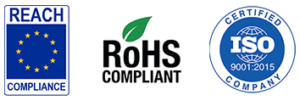Dielectric epoxy provides an insulating layer or medium between two conductive materials (conductors). Put simply, it does not conduct electricity (not electrical conductors). Dielectric materials are used in a variety of applications including making various electronic components such as capacitors. Dielectric epoxies are used extensively as barriers between conductors of multi-layered circuits. Many Epoxyset products are dielectric and are used for their dielectric properties. When reviewing data sheets of our products there are certain values one needs to consider when searching for dielectric properties.
Volume Resistivity
The volume resistivity is the measured electrical resistance through a material when a voltage is applied for a specific amount of time. In simple terms, the volume resistivity measures how easily electricity can flow through a material (how much resistance does the current see); the lower the value the higher the conductivity. Typical dielectric epoxies have volume resistivity values of 1.0 x 1012 ohm-cm or higher at 25 °C. Very low dielectric epoxies (electrically conductive) will have volume resistivity values of <0.001 cm-ohm. When searching for dielectric epoxies, the volume resistivity is the first indicator of its electrical properties. It is also important to note that the volume resistivity decreases as temperature increases meaning it becomes less dielectric. The reason for this is due to the molecular motion of the adhesive. At temperatures above glass transition temperature (Tg), the volume resistivity will decrease and will not give the same dielectric properties compared to the adhesive below Tg. The Tg for each product is different so it is important to know at what temperature your application will be run.
Dielectric Strength
The dielectric strength, also known as the breakdown voltage, is the maximum voltage a material can withstand before failing (breakdown). If an application calls for a voltage to run through the material it is important to know this value. The units for dielectric strength are Volts/mil. The volts tell you the strength of the electrical field and the mils is the thickness of the adhesive. It is important to know the strength of the current so as to calculate the bond line thickness of the epoxy. Generally, at least 2 mils is recommended however for strong currents (>1000V) a thicker bond line is necessary. It is also important to know the temperature the application will be running at. Physical changes that can occur to the adhesive during temperature changes can affect the dielectric strength.
Dissipation Factor
The dissipation factor is the power dissipated by a dielectric adhesive. Typical values for dielectric epoxies are 0.03 at 1kHz and 0.05 or lower at 1MHz. The dissipation factor may also be referred to as the loss tangent. Normally, the dissipation factor is used at lower frequencies, whereas the loss tangent is more applicable for high frequency applications.
Dielectric Constant
The dielectric constant is a ratio of the permittivity of a substance to the permittivity of free space. It is an expression of the extent to which a material can store electric flux (a charge). A typical value for dielectric constant of a dielectric adhesive is between 3.5-6.0 at 1kHz. As with several other properties, the dielectric constant is affected by temperature. A room temperature cured dielectric epoxy subjected to temperature above Tg will experience higher dielectric constant values and in turn the insulating properties diminish.
Applications
While dielectric properties may not always be at the forefront of needs of epoxies, they factor in extensively in electronic packaging applications. Many people know they do not need or want electrical conductivity (dielectric) but ignore major components such as the dielectric strength when choosing an epoxy, drawing specifications, or drawing a process. Common applications of dielectric epoxy include semiconductor flip chip underfill, wafer passivation, glob top encapsulation over integrated circuits (ICs), coil impregnation, SMD staking on PCBs, and ferrite core/drum bonding. Dielectric properties are also important on larger electronic components as well such. When potting and encapsulating capacitors, transformers, filters etc., the dielectric properties are critical to the function of the component.
Epoxyset has a wide variety of dielectric epoxies used in all the above mentioned applications. Our one and two component dielectric epoxy adhesives are engineered to meet demanding application needs. Below are links to epoxy adhesives used extensively for their dielectric properties.
EB-403-1LV-T1 – This is a one component epoxy adhesive that has a very high Tg meaning key dielectric properties are maintained at elevated temperatures.
EB-119M – This 2-part, low viscosity, high-temperature adhesive is a filled epoxy adhesive and potting compound used for coil impregnation, underfill, and wafer passivation. Also has high Tg and high-temperature resistance.
EB-347 – A low CTE, room temperature cure epoxy adhesive used extensively is navigational instrumentation. EB-347 also passes NASA outgassing requirements.
EC-1015 – A high temperature resistant epoxy potting compound used to encapsulate a variety of electronic components including capacitors, transformers, and RFI filter. This low viscosity system is also used in copper coil impregnation.
EC-1012M – A flame retardant epoxy potting compound used extensively in wet winding coils used in linear motors. EC-1012M is completely dielectric and can be paired with 2 different hardeners; one for high-temperature resistance and one for room temperature curing.
EB-316M – One of Epoxyset’s most used products, this 1:1 mix ratio epoxy is a high strength adhesive used for many industrial applications in industries including electronics, medical, and construction.
For more information about Epoxyset dielectric epoxies or assistance in choosing the right product for your application, contact us at +1 (401)-726-4500 or email us at info@epoxyset.com.


